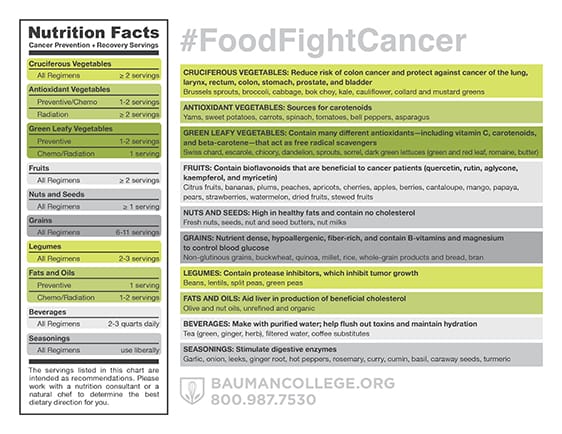Fruits, Vegetables, Herbs, and Spices for Cancer Prevention and Recovery
By Dr. Ed Bauman
Plant foods contain literally thousands of beneficial compounds in addition to macronutrients (complex carbohydrates, proteins, fats, and fiber), micronutrients (vitamins and minerals), and phytonutrients (protective chemical compounds that occur naturally in plants). Biochemist and Nobel Laureate Albert Szent-Gyorgyi first discovered the tremendous power of a family of phytonutrients called flavonoids in 1936.
Thousands more phytonutrients have been discovered since 1936, most of which are now known to be faithful defenders against all types of illness. Phytonutrients abound in the fruits of some plants, in the leaves or stems of others, and in the skin or white pith of still others. These phenomenal phytos act in a synergistic way with other nutrients to regulate critical bodily functions, such as those controlled by the liver and the immune, nervous, and endocrine systems. Choosing a chemical-free Eating for Health® plan takes full advantage of these phytonutrients in the form of fruits, vegetables, and “booster” foods such as herbs, spices, and seaweeds that are critical pieces in the puzzle of maintaining and restoring good health.
Plant Food: Your First Line of Defense
We want to clearly emphasize that food is the best line of defense against breast cancer and its spread. That said, due to biochemical individuality and a history of insufficient micronutrient and phytonutrient intake, targeted supplementation with specialized nutrients may provide immediate backup support. However, we are aware that some folks believe they are getting an insurance policy by washing down their fast food with a chaser of vitamins. This is not a winning strategy. In fact, a report from the International Research Conference on Food, Nutrition, and Cancer concurred that the additive and synergistic effects of phytochemicals in fruits and vegetables are responsible for their powerful antioxidant and anticancer activities (Liu and Felice 2007). With that, let’s look at some of our favorite cancer-fighting foods.

Top 15 Hit Parade of Cancer-Protective Foods
Foods work on multiple body systems to nourish, cleanse, and heal. An Eating for Health® diet provides six to twelve servings a day of fresh, whole fruits and vegetables. Each of the following plant foods contains as many as one hundred cancer-protective phytonutrients. Some of these phytonutrients have been consistently associated with elements of cancer protection and healing in population-based epidemiological studies; others show great promise in laboratory and animal research but are still awaiting confirmation in human research. If you haven’t already tried these foods or made them a part of your weekly routine, you’ll want to add them to your to-do list right away!
| Food | Active Constituents | Proposed Activity* |
| Apple | Phenolic compounds | Inhibit cancer cell proliferation, reduce inflammation |
| Bitter melon | Eleostearic acid | Induces cell-cycle arrest and apoptosis |
| Berries | Flavonols, hydroxycinnamic acids, anthocyanins, and phenolics | Inhibit cell proliferation, lower all inflammatory markers |
| Broccoli | Sulforaphane, indole 3 carbinole | Inhibit breast-cancer stem-cell activity, inhibit cancer-cell motility, enhance detoxification |
| Celery | Apigenin, luteolin | Inhibit aromatase activity |
| Fatty fish (wild) | Omega-3 fatty acids | Anti-inflammatory, downregulates cancer-promoting PcG gene |
| Flax | Lignans, omega-3 fatty acids | Reduce inflammation, downregulate HER-2 expression |
| Garlic | Diallyl disulfide | Reduces cell adhesion and Invasion |
| Green tea | Green tea Epigallocatechin-3-gallate (EGCG) | Inhibits a number of tumor-cell proliferation and survival pathways |
| Lemon | D-limonene, citrus pectin, auraptene | Reduces cancer cell adhesion, downregulates IGF-1 and other growth factors |
| Shiitake Mushrooms | Polysaccharides | Enhances immune system, facilitates cancer-cell cytotoxicity |
| Pomegranate | Ellagitannins | Facilitates antiproliferative and anti-aromatase activity |
| Seaweed | Fucoidan, iodine | Detoxify, promote apoptosis |
| Turmeric | Curcuminoids | Inhibit cell proliferation and invasion, lower inflammation |
| Whey protein (organic) | Immunoglobulins, lactoferrin | Inhibit proliferation of mammary epithelial cells in vitro and in vivo |
*The studies cited here are representative of the many hundreds of studies undertaken to examine the relationship between food and breast-cancer risk and development. For references and more information, check out the Whole Food Guide for Breast Cancer Survivors (2012) by Ed Bauman, Ph.D. and Helayne Waldman, Ed.D., New Harbinger Press